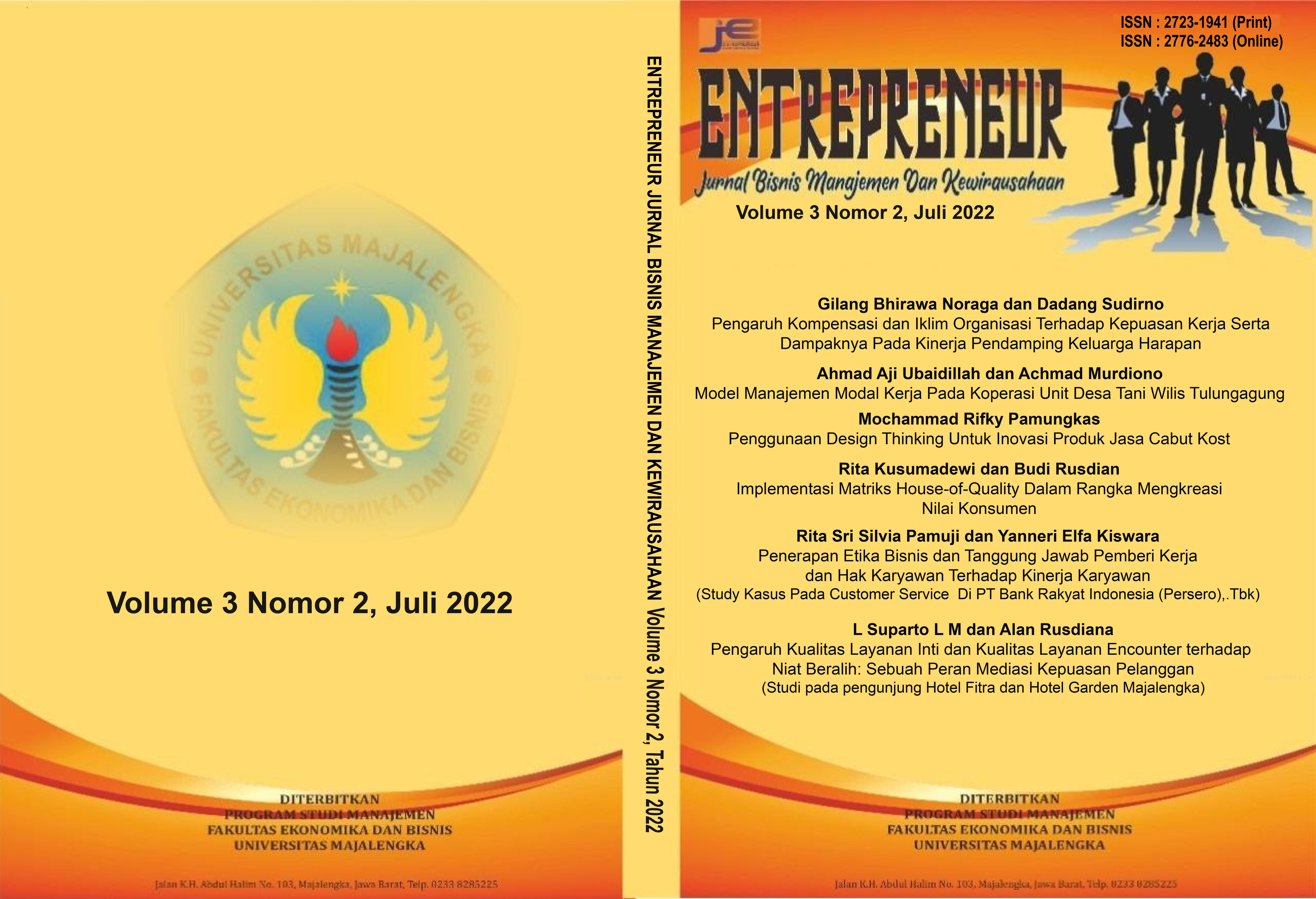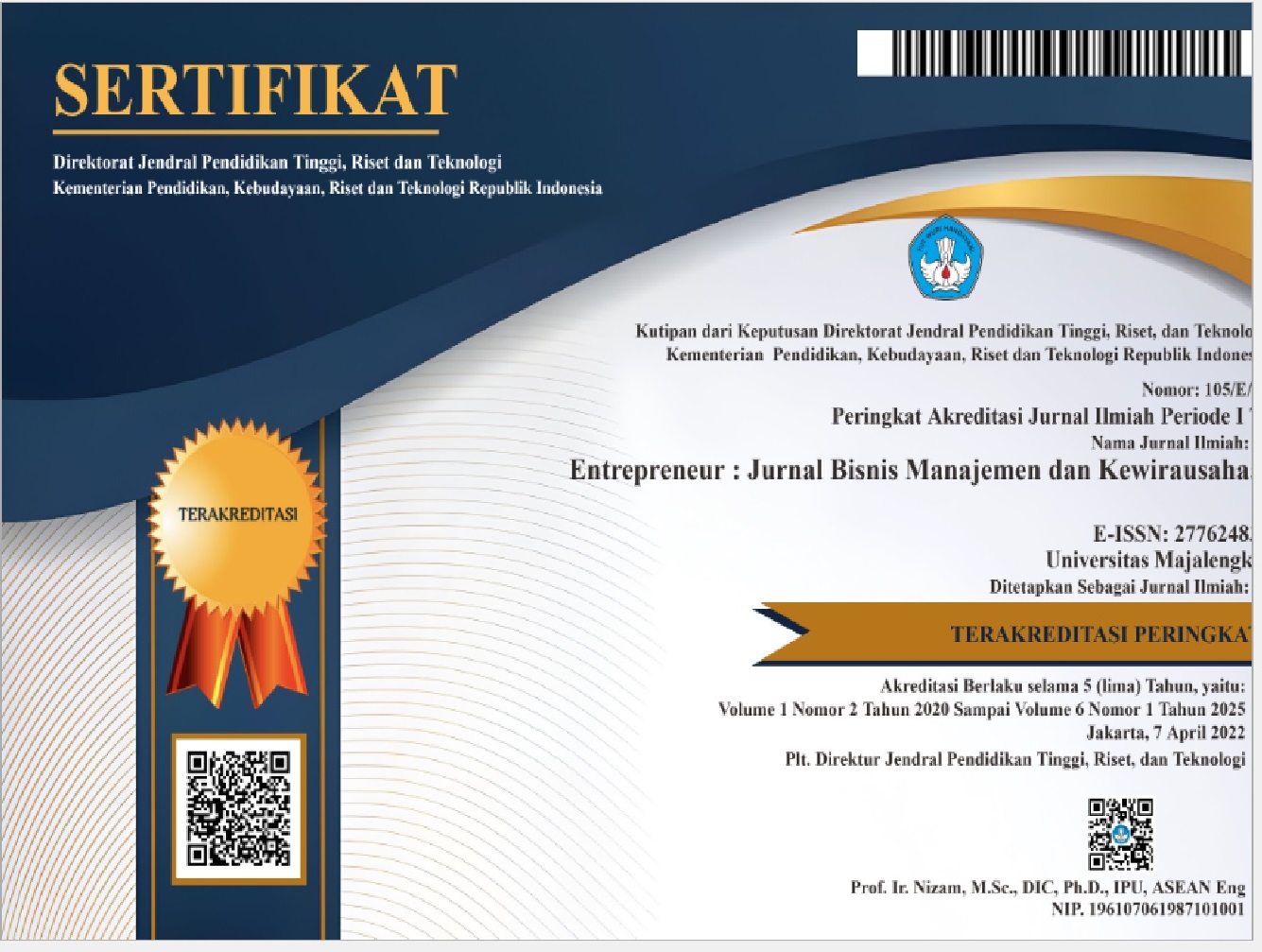Implementasi Matriks House-of-Quality Dalam Rangka Mengkreasi Nilai Konsumen
DOI:
https://doi.org/10.31949/entrepreneur.v3i2.2238Abstract
In the new era of marketing, companies are forced to be able to create consumer value because today's marketing is driven by values. The purpose of this paper is to analyze the value using the House of Quality (HOQ) matrix which is one of the tools of Quality Function Deployment (QFD) which is commonly used to increase value through product attributes that will be given to consumers. Equipped with a matrix that illustrates how to create value using HOQ, using data from research that the author has previously carried out in identifying consumer values at private universities in Region III Cirebon-West Java as an example.
This research uses explanatory survey method with cross sectional development method. The iteration method is used to determine the number of samples, so that a minimum sample of 116 is obtained, but 150 samples will be used so that the results are more representative of the population. The result shows that the indicator that is considered the most important by the respondents is the reputation of the university and the indicator with the lowest rating is the time of completion of studies. However, the results of consumer assessments regarding customer value indicate that the university's reputation is still unable to provide superior customer value. Thus, the reputation of the university is an aspect that must be improved first before other aspects.
Keywords:
Digital Marketing, Product Quality, Customer LoyaltyDownloads
References
Bahar, Arfiani, dan Sjaharuddin, Herman. 2015. Pengaruh Kualitas Produk Dan Kualitas Pelayanan Terhadap Kepuasan Konsumen Dan Minat Beli Ulang. Jurnal Organisasi Dan Manajemen. Vol. 3. Hal. 17 & 19.
Hendrawan, Andi, dkk. Pengaruh Marketing Digital Tewrhadap Kinerja Penjualan Produk UMKM Asti Gauri Di Kecamatan Bantasari Cilacap. Jurnal Administrasi dan Kesekretariatan. Vol. 3. No. 1. Hal. 51.
Laksana, Daniel, dan Dharmayanti, Diah. 2018. Pengaruh Digital Marketing Terhadap Organizational Performance Dengan Intellectual Capital Dan Perceived Quality Sebagai Variabel Intervening Pada Industri Hotel Bintang Empat Di Jawa Timur. Vol. 12. No. 1. Hal. 11-12.
Nadya. 2016. Peran Digital Marketing Dalam Eksistensi Bisnis Kuliner Seblak Jeletet Murni. Jurnal Riset Manajemen dan Bisnis. Vol. 1. No. 2. Hal. 135.
Pradiani, Theresia. 2017. Pengaruh Sistem Pemasaran Digital Marketing Terhadap Peningkatan Volume Penjualan Hasil Industri Rumahan. Jibeka, Vol. 11. No. 2. Hal. 46, 48
Purnama Sari, Herviana Vidya, dan Anjarwati, Anik Lestari. 2018. Pengaruh Kualitas Produk dan Harga Terhadap Loyalitas Dengan Kepuasan Sebagai Variabel Intervening (Studi Pada Konsumen Biskuit Oreo Di Carrefour Surabaya. Vol. 6. No. 1. Hal. 2.
Sidi, Agus Purnomo. 2018. Pengaruh Kualitas Produk, Kualitas Pelayanan dan Digital Marketing Terhadap Loyalitas Pelanggan.JIBEKA. Vol. 12. No. 1. Hal. 1-2.
Widayatwa, Cindy Phasalita, Lestari, Sri Puji. 2018. Pengaruh Kualitas Produk Terhadap Loyalitas Konsumen Dengan Kepuasan Konsumen Sebagai Variabel Intervening. Jurnal Ilmiah UNTAG Semarang. Vol. 7. No. 3. Hal. 28.
Winata, Andri, dan Fiqri, Isnawan Ahlul. 2017. Pengaruh Harga dan Kualitas Jasa Terhadap Loyalitas Pelanggan Hotel Emersia Di Bandar Lampung. Jurnal Manajemen Magister. Vol. 03. No. 02. Hal. 139.

Published
How to Cite
Issue
Section
License
Copyright (c) 2022 Rita Kusumadewi, Budi Rusdian

This work is licensed under a Creative Commons Attribution-ShareAlike 4.0 International License.
COPYRIGHT NOTICE
An author who publishes in the Entrepreneur: Jurnal Bisnis Manajemen dan Kewirausahaan agrees to the following terms:
1. Author retains the copyright and grants the journal the right of first publication of the work simultaneously licensed under the Creative Commons Attribution-ShareAlike 4.0 License that allows others to share the work with an acknowledgment of the work's authorship and initial publication in this journal
2. The author is able to enter into separate, additional contractual arrangements for the non-exclusive distribution of the journal's published version of the work (e.g., post it to an institutional repository or publish it in a book) with the acknowledgment of its initial publication in this journal.
3. The author is permitted and encouraged to post his/her work online (e.g., in institutional repositories or on their website) prior to and during the submission process, as it can lead to productive exchanges, as well as earlier and greater citation of the published work







